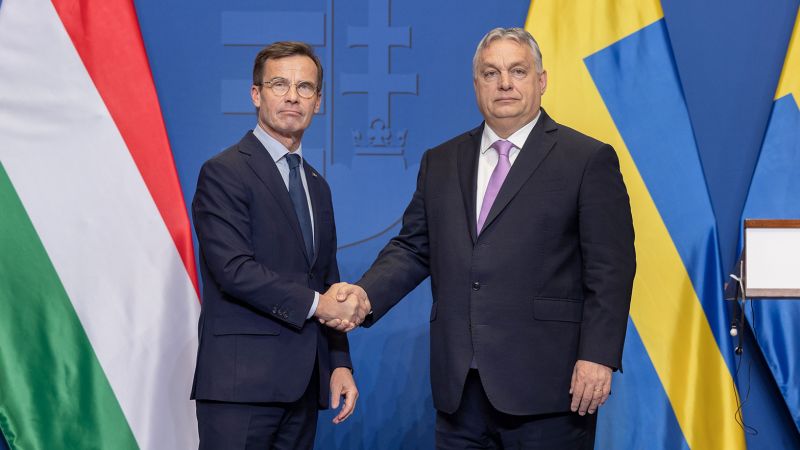Sweden’s NATO Membership Bid Secures Green Light as Hungary Gives Final Approval
The Hungarian parliament overwhelmingly approved Sweden’s request to join NATO on Monday, paving the way for the Nordic country’s entry into the alliance after nearly two years of intense negotiations and delivering a geopolitical setback to Russian President Vladimir Putin.
Approval from the Hungarian parliament was the final obstacle for Sweden to join NATO. Swedish Prime Minister Ulf Kristersson visited Budapest on Friday to discuss defense and security cooperation with his Hungarian counterpart, Viktor Orban. The two sides appeared to reconcile, agreeing on a deal that would see Hungary acquire four new Swedish-made Gripen fighter jets. Only six of the 194 members of parliament who voted rejected Sweden’s accession. “Today is a historic day,” Kristersson said shortly after the vote. “Sweden stands ready to shoulder its responsibility for Euro-Atlantic security.”
Sweden will formally join the alliance after it submits its instrument of accession with the United States government, which is the depository of the North Atlantic Treaty. NATO Secretary-General Jens Stoltenberg confirmed Sweden’s membership after all allies approved its bid to join. “Sweden’s membership will make us all stronger and safer,” he said.
With Sweden’s accession, NATO will count 32 countries among its members, an ironic twist given that Russia launched its war against Ukraine in part due to the alliance’s growth in Eastern Europe along Russia’s border. Last year, Finland became the 31st NATO member, adding some 1,300 kilometers (830 miles) to the alliance’s frontier with Russia.
As NATO states, Finland and Sweden will enjoy the protection granted under Article 5 of the treaty that established the alliance – which states that an attack on one member is considered an attack against all. Sweden and Finland announced their intention to join the alliance in response to Russia’s invasion of Ukraine, abandoning the decades-long policy of non-alignment that defined both states’ foreign relations during the Cold War.
NATO has an open-door policy, meaning that any country can be invited to join if it expresses an interest and is able and willing to uphold the principles of the bloc’s founding treaty. However, under the accession rules, any member state can veto a new country from joining.
While most NATO members quickly approved Finland and Sweden’s applications, Hungary and Turkey held out for some time. Turkish President Recep Tayyip Erdogan accused Finland and Sweden of being too lenient toward Kurdish terrorist organizations, while Orban claimed they were spreading “outright lies” about his country’s failure to adhere to European Union standards on the rule of law – fundamental values enshrined in EU treaties.
Such concerns prompted the EU to freeze billions of dollars’ worth of funds meant for Hungary until such concerns were addressed. Hungary and Turkey later both softened their stance on Finland’s membership and approved its application last March. The Turkish parliament approved Sweden’s entry last month, after Stockholm tightened its anti-terror legislation and pledged closer cooperation with Turkey on security concerns. Shortly after the Turkish vote, Orban told NATO chief Stoltenberg that his government would also support Swedish membership.
The Hungarian leader said during his state of the nation speech on February 17 that the country would be able to ratify Sweden’s accession at the start of the spring session of parliament on Monday. “Hungary has a vested interest in Europe’s security,” government spokesman Zoltan Kovacs said after the vote on Monday. “In Sweden we have a strong and reliable ally who will benefit the future of NATO for the better.”
NATO allies had been concerned that, while Orban was publicly supportive of Sweden’s bid, the country had spent months stalling. Budapest’s foot-dragging elicited concerns that Orban, the EU leader closest to Putin, was acting in a manner that benefited the Kremlin. In recent weeks, however, Europe has had some success in getting Hungary to fall in line with the bloc’s foreign policy goals.
Budapest earlier this month dropped its objections to an EU funding deal for Ukraine worth $50 billion, which Orban had vetoed in December on procedural grounds. Orban’s critics had accused him of blocking the deal in response to the EU’s decision to withhold the funds meant for Hungary. Hungary denied there was any connection between the two.
Sweden’s accession to NATO comes at a crucial time in the war in Ukraine, with Russia finding renewed success on the battlefield and cracks appearing to emerge in Western support for Kyiv after two years of fighting. Focus has also shifted away from Europe since the October 7 Hamas attacks on Israel.

